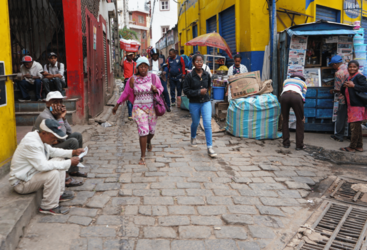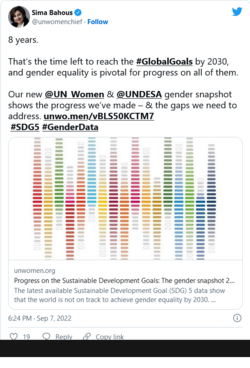Women's Agenda (Archive) - September 12, 2022
by, Jessie Tu

Full gender equality may take up to 300 years if the current rate of progress does not change, according to this year’s Gender Snapshot report from UN Women.
The annual report by UN Women and the UN Department of Economic and Social Affairs (UN DESA) assesses the status of gender disparities around the world — with the aim of closing then entirely, and adressing one of the UN’s 17 Sustainable Development Goals (SDGs) by 2030.

The study shows the gender divide worsening due to “cascading” global crises, including the COVID-19 pandemic, climate change and the curtailing of women’s sexual and reproductive health and rights.
By the end of 2022, almost 383 million women and girls will live in extreme poverty, compared to 368 million men and boys, according to the report.
Sima Bahous, Executive Director at UN Women, called the present moment a “tipping point” for women’s rights and gender equality.
“It is critical that we rally now to invest in women and girls to reclaim and accelerate progress,” she said. “The data show undeniable regressions in their lives made worse by the global crises – in incomes, safety, education and health. The longer we take to reverse this trend, the more it will cost us all.”

The report revealed that worldwide, women lost roughly $800 billion in income due to the COVID-19 pandemic, while their participation in the job market continued to decline compared with previous years.
In Ukraine, women continue to face more hardship and poverty as food insecurity and hunger rise. As Russian forces continue their invasion, limited wheat, fertiliser and fuel supplies have left hundreds of thousands of Ukrainians unable to access basic needs.
In sub-Saharan Africa, more women and girls are expected to live in extreme poverty by 2030 compared to today, if current trends continue.
Maria-Francesca Spatolisano, an Assistant Secretary-General at UN DESA, said that recent world events have disproportionately impacted the world’s most vulnerable population groups — especially women and girls.
“Cascading global crises are putting the achievement of the SDGs in jeopardy,” Spatolisano said. “Gender equality is a foundation for achieving all SDGs and it should be at the heart of building back better.”
By the report’s estimation, it may take up to 140 years for women to achieve equal representation in leadership roles in the workplace, and 40 years to achieve equal representation in national parliaments.
Gender equality can be fostered by improving universal girls’ education — as several studies have shown in the past.
According to the latest report, each additional year of schooling can increase a girl’s future income by up to 20 per cent, while also improving her maternal health, lower her chances of child mortality, protect her from HIV and reduce her risk to violence.
The latest Snapshot report recommends legal systems around the world legislate for violence against women and protect women’s rights in marriage and family. Increasing national funding towards gender equity initiatives are also identified as important solutions.
“Structural barriers to gender equality, including discriminatory norms, laws and practices [must be] addressed and dismantled,” the report said.
by, Jessie Tu

Full gender equality may take up to 300 years if the current rate of progress does not change, according to this year’s Gender Snapshot report from UN Women.
The annual report by UN Women and the UN Department of Economic and Social Affairs (UN DESA) assesses the status of gender disparities around the world — with the aim of closing then entirely, and adressing one of the UN’s 17 Sustainable Development Goals (SDGs) by 2030.

The study shows the gender divide worsening due to “cascading” global crises, including the COVID-19 pandemic, climate change and the curtailing of women’s sexual and reproductive health and rights.
By the end of 2022, almost 383 million women and girls will live in extreme poverty, compared to 368 million men and boys, according to the report.
Sima Bahous, Executive Director at UN Women, called the present moment a “tipping point” for women’s rights and gender equality.
“It is critical that we rally now to invest in women and girls to reclaim and accelerate progress,” she said. “The data show undeniable regressions in their lives made worse by the global crises – in incomes, safety, education and health. The longer we take to reverse this trend, the more it will cost us all.”

The report revealed that worldwide, women lost roughly $800 billion in income due to the COVID-19 pandemic, while their participation in the job market continued to decline compared with previous years.
In Ukraine, women continue to face more hardship and poverty as food insecurity and hunger rise. As Russian forces continue their invasion, limited wheat, fertiliser and fuel supplies have left hundreds of thousands of Ukrainians unable to access basic needs.
In sub-Saharan Africa, more women and girls are expected to live in extreme poverty by 2030 compared to today, if current trends continue.
Maria-Francesca Spatolisano, an Assistant Secretary-General at UN DESA, said that recent world events have disproportionately impacted the world’s most vulnerable population groups — especially women and girls.
“Cascading global crises are putting the achievement of the SDGs in jeopardy,” Spatolisano said. “Gender equality is a foundation for achieving all SDGs and it should be at the heart of building back better.”
By the report’s estimation, it may take up to 140 years for women to achieve equal representation in leadership roles in the workplace, and 40 years to achieve equal representation in national parliaments.
Gender equality can be fostered by improving universal girls’ education — as several studies have shown in the past.
According to the latest report, each additional year of schooling can increase a girl’s future income by up to 20 per cent, while also improving her maternal health, lower her chances of child mortality, protect her from HIV and reduce her risk to violence.
The latest Snapshot report recommends legal systems around the world legislate for violence against women and protect women’s rights in marriage and family. Increasing national funding towards gender equity initiatives are also identified as important solutions.
“Structural barriers to gender equality, including discriminatory norms, laws and practices [must be] addressed and dismantled,” the report said.